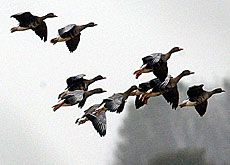
Wild fowl screened to avert bird-flu threat

The Swiss authorities began testing migratory birds for avian influenza this weekend as part of a Europe-wide screening programme.
Millions of wild birds fly over Swiss territory during the autumn migration period and it is feared that some of them could be carriers of the deadly virus.
The detection of bird flu in Russia has prompted European nations to step up preventive measures. The Netherlands has already instructed farmers to keep poultry indoors.
A sub-strain of avian flu, known as H5N1, is considered the biggest direct disease threat to humans because it mutates rapidly and can also acquire genes from other viruses.
Health experts predict that if H5N1 acquired the ability to infect people easily, and rapidly spread from person to person, it would kill as many as seven million worldwide and make more than 25 million people seriously ill. Other predictions cite much higher figures.
H5N1 re-emerged in South Korea in 2003, after an initial outbreak in Hong Kong in 1997 was brought under control. It has now been found in birds in 12 Asian countries as well as Kazakhstan and Russia.
Scandinavia and Siberia
According to Matthias Kestenholz of the Swiss Ornithological Institute, most birds arriving in Switzerland come from Scandinavia and the western part of Russia but there are also some migrants from western Siberia.
The aim is to take faeces samples from up to 1,000 water birds and songbirds over a three-month period in the Lucerne and Basel regions. No birds will be killed or injured in the screening process.
If any bird samples test positive for avian influenza, the authorities will take steps to limit exposure to infection.
Cornelia Herholz of the Federal Veterinary Office said a four-step response programme was already in place, with different levels of severity. One of the measures would be to instruct farmers to keep their poultry indoors.
“The Swiss surveillance programme is part of a European programme and ours fits very well within the context of the pan-European measures,” Herholz told swissinfo.
Essential precautions
Although Herholz believes the risk of bird flu spreading to Western Europe is small, she says precautionary measures are very important.
The risk of infection from illegally imported live birds and poultry meat is even greater than that from migratory birds, Herlholz claimed.
Two antiviral drugs can help against bird-flu infection and may even prevent it if taken at the right time.
These are Tamiflu from Switzerland’s Roche pharmaceutical company and GlaxoSmithKline’s Relenza.
The threat of a pandemic has led to a run on both drugs. Roche has already received orders from 30 countries, including France (13 million doses) and Britain (14.6 million).
Drug stockpiles
Switzerland is also stockpiling reserves of these drugs. From now to the end of the year, there should be enough supplies to treat 25 per cent of the population in the case of a pandemic, according to the Federal Health Office.
Roche has pledged to make a batch of three million antiviral treatments available to the World Health Organization (WHO), to be used to establish an international rapid-response stockpile.
The WHO maintains that all prerequisites for the outbreak of a pandemic have been met so far except one – the establishment of efficient human-to-human transmission.
“Human cases are continuing to occur and each new case gives the virus an opportunity to evolve towards a fully transmissible pandemic strain,” the latest WHO situation-assessment document says.
The Swiss Federal Veterinary Office has set up a migratory-birds screening programme to monitor the risk of avian influenza infection from the East.
The H5N1 avian flu virus has killed at least 64 people in Asia since late 2003.
Any infection passed on to Switzerland’s 7.2 million domestic poultry population could have disastrous consequences not only for the poultry industry but also for society as a whole.
Public-health experts predict millions of deaths worldwide if there is a mass outbreak of bird flu in humans.
Ways the bird-flu virus could be spread to Europe:
Importing contaminated poultry products (import bans in place)
Illegal imports (smuggling of meat and live birds)
Migratory birds
Travel of infected humans

In compliance with the JTI standards
More: SWI swissinfo.ch certified by the Journalism Trust Initiative






























You can find an overview of ongoing debates with our journalists here . Please join us!
If you want to start a conversation about a topic raised in this article or want to report factual errors, email us at english@swissinfo.ch.